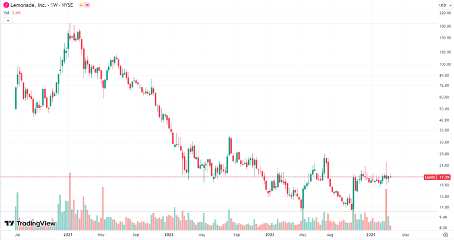

Lemonade's AI Revolution in Insurance
Lemonade, a pioneering company in the insurance industry, is leveraging artificial intelligence (AI) to revolutionize the traditional insurance model. By automating processes such as policy purchasing and claims handling, Lemonade aims to offer personalized quotes and rapid service. This innovative approach has shown promising results, with the company reporting a significant growth in customers and an increase in gross earned premiums.
Initially focusing on renters' insurance, Lemonade has since expanded its offerings to include homeowner's, pet, life, and automotive coverage. This strategic diversification has contributed to its customer base surpassing 2 million, marking a substantial growth from previous years. Despite this success, Lemonade's ambitious growth strategy has not been without its financial challenges, as evidenced by its net losses over the past three years.

Performance of Lemonade, Inc. stock since it´s IPO. Source: tradingview.com
However, Lemonade's recent financial results indicate an improvement in its underwriting profitability and a reduction in its net loss ratio. The company's efforts to refine its AI-powered risk pricing algorithm are beginning to bear fruit, with a goal to consistently achieve a loss ratio of around 75%. Despite these positive trends, investor skepticism remains, particularly due to concerns over future revenue forecasts and the potential impact on profitability as the company aims to accelerate growth in 2024. [1]
For investors contemplating Lemonade's stock, it's essential to recognize the inherent risks of investing in a company at the forefront of disrupting a well-established industry. With Lemonade's stock significantly below its all-time high and trading at a potentially attractive valuation, it may present an opportunity for those with a higher risk tolerance and a long-term investment horizon.* [2]
* Past performance is no guarantee of future results.
[1,2] Forward-looking statements are based on assumptions and current expectations, which may be inaccurate, or based on the current economic environment which is subject to change. Such statements are not guaranteeing of future performance. They involve risks and other uncertainties which are difficult to predict. Results could differ materially from those expressed or implied in any forward-looking statements.




